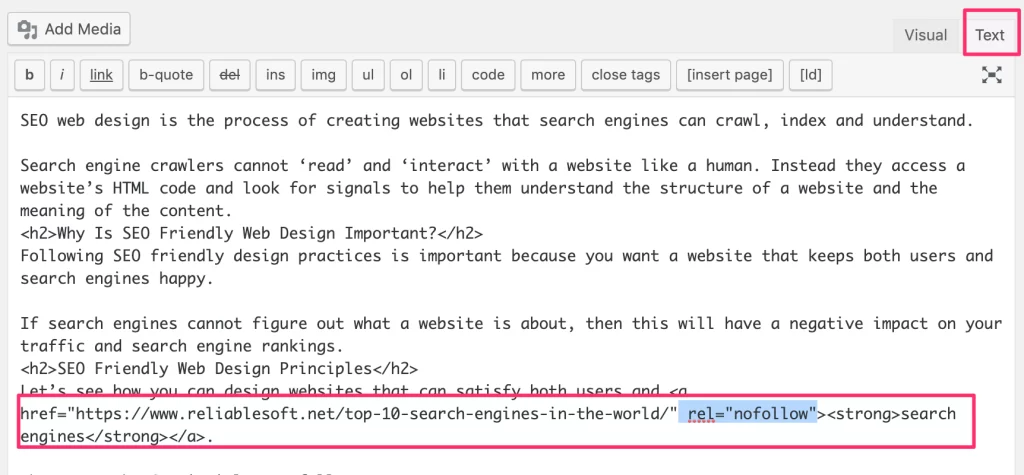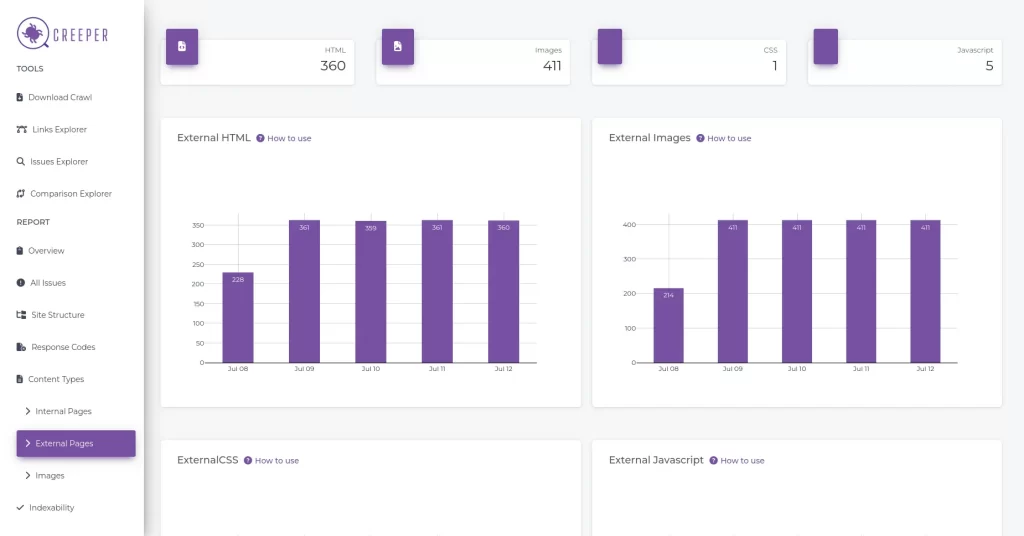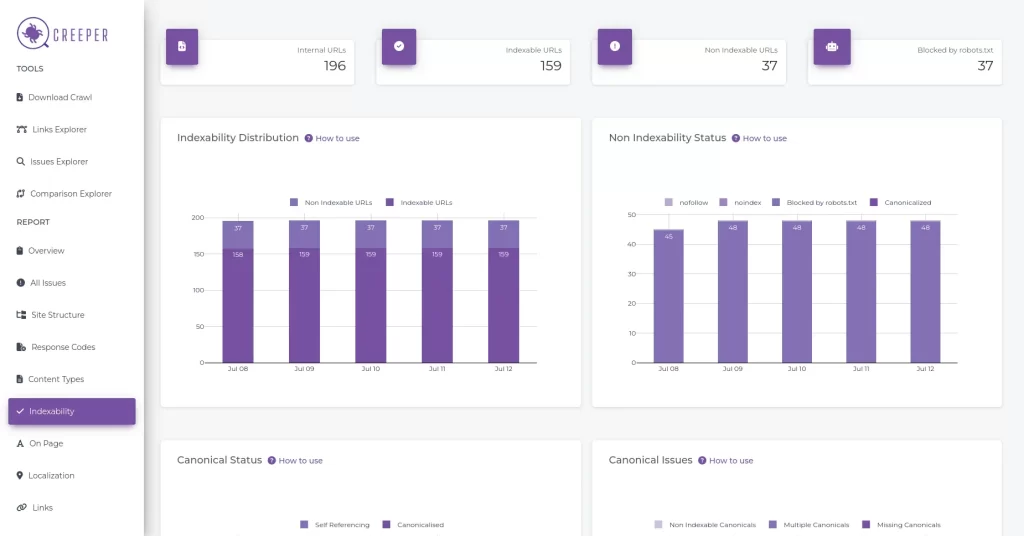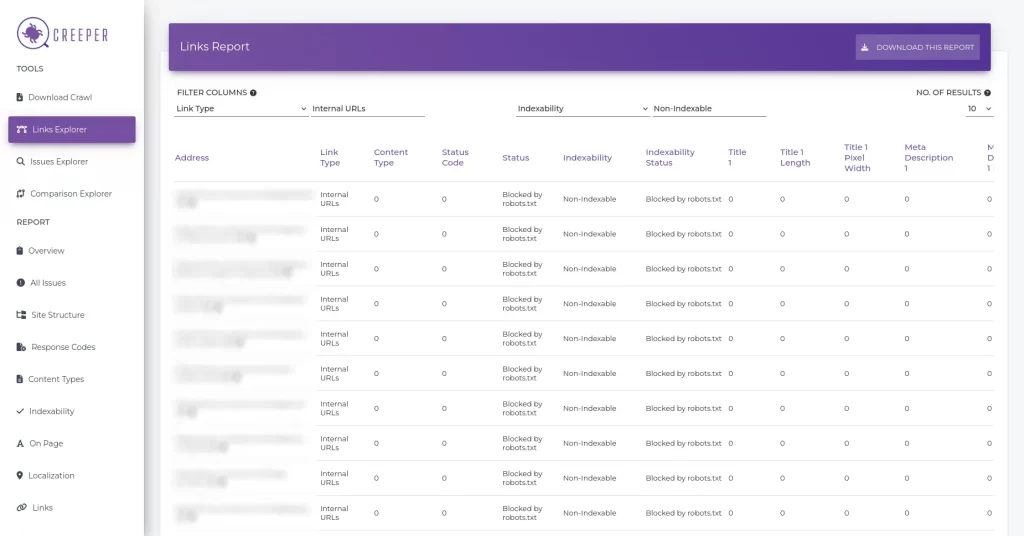Learn Creeper
Internal vs External Nofollow Links
Internal vs external nofollow links indicate whether the links within a webpage are using the “nofollow” attribute. The “nofollow” attribute instructs search engines not to pass ranking signals through the links.

Distinguishing between internal and external nofollow links helps understand the distribution of nofollow attributes within a website.
- Internal nofollow links are links on a website that point to other pages within the same domain but are marked with a “nofollow” attribute, meaning search engines won’t pass any authority or PageRank to the linked pages.
- External nofollow links, on the other hand, are links pointing to pages outside the website’s domain with the same “nofollow” attribute applied, indicating to search engines not to follow or give weight to those links.
Why Are Internal and External Nofollow Links Important For SEO?
The impact of internal and external nofollow links on SEO can vary. Internal nofollow links may affect the flow of PageRank within a website, potentially impacting how search engines crawl and index its pages.
External nofollow links do not directly contribute to a website’s backlink profile or domain authority, but they can still be beneficial in terms of user experience and referral traffic.
How Do Internal/External Nofollow Link Issues Happen?
Internal nofollow and external nofollow issues often occur due to misconfigurations or intentional decisions by website owners or developers.
Common reasons include improper implementation of rel=”nofollow” tags, use of certain CMS plugins or themes that automatically add nofollow attributes, or attempts to sculpt PageRank flow within a site.
Improper implementation of rel=”nofollow” tags for internal linking can be catastrophic for a website because it causes indexing issues and does not transmit PageRank to other pages on the same website.
You can use the Creeper SEO Audit tool to thoroughly investigate the website’s internal and external nofollow issues.You can do so by logging into your account and then viewing the most recent crawl report for your project.
Identifying Internal and External NoFollow Links Using Creeper
To begin, navigate to the “Content Types” > “Internal Pages” and “External Pages” reports on the left navigation panel. These reports will help you understand the website’s internal and external content structures.

To narrow down your research on the website’s nofollow link status. You can access the “Indexability” report using the Creeper SEO Audit tool’s left navigation panel. This gives you access to your website’s Non-Indexability Status report. This report shows the total amount of internal nofollow links on the site.

The next step would be to navigate to the “Links” report on your Creeper dashboard. This report looks into the differences between internal and external no-follow links, as well as issues with external link anchors.
Once you’ve gathered basic insights from the reports listed above, you can start gathering data and identifying individual URLs with internal and external linking issues. Go to the “All Issues” report to see all internal URLs with the rel=”nofollow” tag.
Using Creeper SEO Audit’s Links Explorer Tool to Identify Non-Indexable and NoFollow Internal Links
You can also utilize the “Links Explorer” tool to segregate internal and external no-follow links for analysis. You may accomplish this by utilizing filters. For example, if you set one of the filters to “Link Type” and then type “Internal URLs”. Your report will only show internal URLs. Furthermore, if you set the second filter to “Indexability” and type “Non-Indexable”. Your Links Explorer Report will now break down and list all internal non-indexable URLs. Now, verify the Indexability Status of all of these URLs to see if you mistakenly set any Internal URLs to no-follow that weren’t supposed to be. Visit your website to resolve the issue.

It’s advisable to conduct a thorough audit of their site’s linking structure, ensuring that internal links are appropriately tagged with nofollow attributes only when necessary.
For external links, it’s essential to review any plugins or scripts that might automatically add nofollow attributes and adjust settings accordingly. Additionally, fostering natural link-building strategies can help improve the overall SEO performance of a website.
Analyzing the distribution of nofollow links can help adjust the link structure and optimize the flow of ranking signals within the website.
Internal and External Nofollow Links Issues Resolving Checklist
| Resolving Step | About |
|---|---|
| Audit Internal Links |
|
| Review External Links |
|
| Inspect CMS Plugins or Themes |
|
| Update Rel=”Nofollow” Tags |
|
| Implement Natural Link Building |
|
| Regular Monitoring and Maintenance |
|
- Improved Site Structure: Proper internal and external link usage with nofollow tags improves site structure and provides a better user experience.
- Better SEO: Utilizing nofollow tags correctly improves SEO by indicating to search engines which pages should be prioritized.
- Improves Crawlability: Properly tagged internal links help search engines like Google navigate your website, making it easier for them to find and index all your pages, including new or updated content.
- Spreads Link Equity to Other Pages: Internal and external links pass authority from one page to another, helping to boost the ranking potential of less visible pages by linking them to more popular ones.
- Improves Site Engagement: Internal links encourage users to explore more pages on your site, increasing the time they spend on your site and potentially improving your search engine ranking.
- Helps Google Find More Keywords: By linking related pages with relevant anchor text, you help Google understand the keywords associated with each page, improving your chances of ranking for those keywords. If the the links are marked as “nofollow”, Google will ignore that link.
Put our expertise to work
Creeper’s search engine marketing services are guided by a single guiding principle: generating consistent ROI while providing great account management.
We understand that obtaining exceptional achievements isn’t enough. Search marketing provides useful information about numerous elements of your organization. That is why we encourage open communication and in-depth talks to guarantee that our web marketing efforts benefit your complete organization.
Let us know how we can assist you today!
Contact Creeper now and discover how our search engine marketing services can benefit your business.
